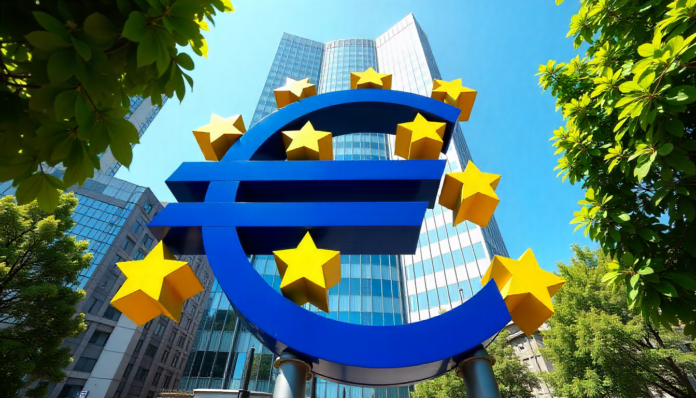
Jürgen Schaaf, advisor to the European Central Bank (ECB), warns of the challenges Europe faces in the global stablecoin market.
The European Central Bank (ECB) advisor has highlighted the challenges Europe faces in the dynamic world of stablecoins, digital assets that maintain a stable value by being backed by traditional currencies. Although this market has grown exponentially worldwide, with a value close to $280.000 billion, The euro's share in this sector remains very modest., representing just around 0,15% of the global total.
Europe is currently in a phase of observation and adjustment, promoting rigorous regulation through the framework known as the MiCA (Markets in Cryptoassets) regulation, designed to ensure the security, transparency, and necessary backing for euro-denominated stablecoins. However, despite this regulatory and policy effort, the US dollar's global dominance in stablecoins remains overwhelming, exerting significant influence on the international financial infrastructure.
TRADE WITH EURO STABLECOINSSheep warns This reality presents a significant challenge to European monetary sovereignty, as the growing adoption of dollar-pegged stablecoins could erode the ECB's control over monetary policy and financial stability in the eurozone. However, Schaaf emphasizes that this disruption is not only a threat, but also an opportunity.
"Without a strategic response, European monetary sovereignty and financial stability could be eroded. However, within this disruption lies an opportunity for the euro to emerge stronger.", Schaaf commented.
The combination of a well-implemented digital euro and a coordinated strategy supporting European stablecoins can serve to reduce digital dependence on the dollar and protect European monetary autonomy. Thus, Schaaf emphasizes that if we act with an innovative and regulatory vision, there is an opportunity for the euro to emerge stronger on the global stage, gaining relevance and influence over the dominant US digital currencies.
Their analysis invites us to rethink European strategy, recognizing that the new digital reality in the financial sector transforms challenges into potential levers for consolidating the euro's autonomy and international relevance, always with a professional, realistic approach oriented toward responsible innovation.
Europe in the global stablecoin market
Stablecoins have become an essential pillar within the crypto universe, constantly boosting their value and utility in areas as diverse as digital payments, decentralized finance, and international trade. Today, the majority of the market is dominated by stablecoins pegged to the US dollar, reflecting not only the strength of this currency but also its undisputed role as a global currency. More than 99% of total stablecoin capitalization is linked to this peg with the greenback, underscoring the dollar's hegemony in the global financial space.
In contrast, European stablecoins, backed by the euro, are still in their infancy. Despite having a promising potential, its size in terms of value and technological adoption is still quite limited. While dollar-pegged currencies are advancing rapidly, these European alternatives are in their early stages, facing challenges in their growth within the competitive international market.
This difference is largely explained by different regulatory approaches and institutional contexts. In the United States, the recent approval of a specific regulation for stablecoins, the GENIUS Act, which was finalized just a few weeks ago during Crypto Week organized by Congress, creates a more favorable framework for their development.
On the other hand, Europe offers a more careful and comprehensive approach through the MiCA Regulation, One of the most comprehensive and pioneering regulations in the field of stablecoinsHowever, while MiCA provides clear and robust oversight that seeks to protect the market and users, this same regulatory rigor can influence the pace of adoption and expansion of European stablecoins with robust ecosystems, as it introduces additional requirements for projects seeking to grow rapidly.
BUY EUROE ON BIT2METhe eurozone faces a digital future: the euro and stablecoins can transform the economy
According to Schaaf, Europe is at a crucial moment in the face of the unstoppable growth of US stablecoins. For the eurozone, this trend is not only a challenge, but also an opportunity to consolidate its monetary independence and give new impetus to the euro, both in its traditional form and in its digital version, created by the European Central Bank.
While dollar-denominated stablecoins are rapidly gaining ground, almost completely dominating the global market, Europe still has a key role to play. The development of euro-backed stablecoins, under a solid and transparent regulatory framework, would offer real and reliable alternatives to US stablecoins. This would not only help protect the ECB's autonomy over European monetary policies but would also strengthen the euro's role in the global digital economy, avoiding a potential increase in financing costs and excessive dependence on the dollar.
The advantages of investing in euro-denominated stablecoins are clear. Schaaf emphasized that these digital currencies are increasingly used for Fast and affordable international payments, remittances and e-commerce, areas in which large US platforms and companies such as Visa, Mastercard, Amazon, and Walmart already participate. The adoption of stablecoins generates efficiency and speed in transaction settlements, in addition to enabling new uses in decentralized finance, tokenized asset exchanges, and interbank transactions.
However, Europe must ensure that these innovations are integrated with financial regulation, ensuring transparency and security to avoid risks associated with exposure to counterparties and traditional financial systems, Schaaf emphasized.
The digital euro and European stablecoins represent a dual strategic tool for maintaining monetary sovereignty in a world where money is rapidly digitizing. They are the way to ensure that the European currency is not relegated to a secondary role in digital payments and global finance. In this way, Europe will not only protect its economic independence but also open the door to more inclusive, faster, and more secure payment systems that benefit citizens and businesses.
TRADE WITH EURR HERE


